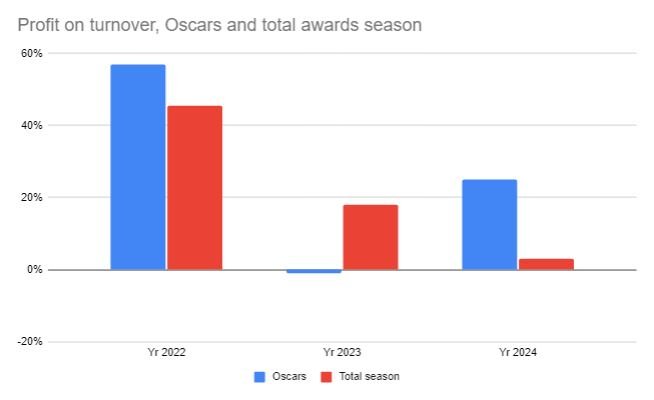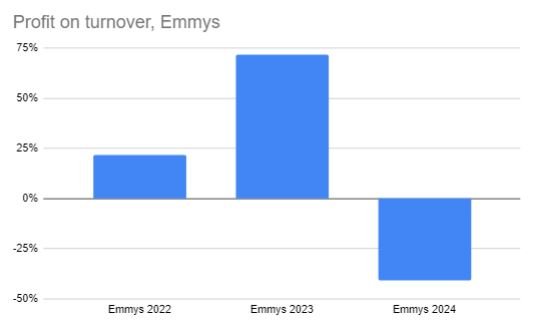The Zone of Betting Introspection: 10 powerful betting lessons (part 2)
Before sliding into his off season slippers, The Professor pulls out the rubber glove for a probe into the entertainment awards betting season that was.
Who drank the milkshake this awards season? At the conclusion of every awards betting season, with adrenaline and booze pulsing, the trio of our betting analysts hold an accountability session. The ultimate KPI of accountability is profit on turnover (POT).
For Oscars only betting this season, I emerged victorious between the three of us, with a POT of +25%, with Tony-Coca Cola producing 14%.
Across the whole season, which began in April 2023 at the MTV Movie Awards, it was Tony-Coca Cola who came out in front with an incredible +24%. In honour of Daniel Plainview in There Will Be Blood, it was Tony who drank the most milkshake, draining the funds of bookmakers across the land.
With the fine print currently under review by Tony’s team of lawyers and accountants, I plan to stake my fellow awards betting analyst for next season. Tony is a different style of bettor, and I can cash on his alternative method. Next season I will be staking his next awards season, with a share of his profits.
While my Oscars betting was a profitable exercise, everything that came before it was largely loss making. Before Oscars Sunday, I was behind with a negative 31% POT.
Start - The Professor Soon after the Greta Gerwig snub firestorm, I consciously filtered my social media feed and consumption. The awards season is a tsunami of opinions, many of them ill informed and agenda filled. Film twitter is a tiny proportion of the actual population in the US and what voters actually think about. Too much time spent on the platform skews one’s thinking, often the wrong way.
1. Less attention on Film Twitter
To filter out the noise, I therefore assembled a ‘board of directors’ with whom I would only consult, and would inform my selections and bets. This board were logical and boasted a track record of awards predictions. These individuals became the sounding board, not the shouting of social media.
2. Bet on actors
Stone and Gladstone were my heaviest investments at the 2024 Oscars. What has emerged over my betting history is that it is easier, and more profitable to bet on humans rather than Picture and below the line (BTL) categories.
With humans, there are more known factors, and fewer unknowns. With actors, you know what you’re getting. There’s the likeability factor plus the narrative which is known. For next season, I will be increasing my bet size on acting categories, and decreasing dollars on the Best Picture contenders.
Stop - The Professor For the second consecutive year, I had too many options, too many plays in early betting predictions on Best Picture. The lure is strong: it is the first and only Oscars betting market available for months.
3. Lower stake in Best Picture
In the minority of times I struck it right (Oppenheimer at 9-1 odds), but when the wallet is filled with six other contenders, the overall profitabiility across the category is diluted.
At the time, the reasoning of finding a Best Picture winner was latching onto which film would be the challenger. Every year there is a second placed challenger in the Best Picture race. Over the last two years, consider the final sprint of phase two: CODA steamrolled The Power of the Dog, and frontrunner The Fabelmans was overtaken by the pack of Everything Everywhere All at Once. Both winners gathered momentum at the right time, both were at attractive odds before the snowball effect.
The 2024 Academy Awards were unusual in the Best Picture contest. It wasn’t a contest, there was no film close in second place. It was Oppenheimer all the way. This anomaly is not the trend over recent years.
4. Quality processes and smart decisions will look after the long(er) term
Over the last twelve months, I spent much time thinking about my thinking. That is, an audit on my own betting biases. By knowing oneself, you can counterweight the weaknesses and biases to arrive at better objectivity.
So how can a bettor make smarter decisions when you don’t know all the facts? This is explored in Annie Duke’s book Thinking in Bets: Making Smarter Decisions When You Don't Have All the Facts.
An exponent of stopping thinking that the outcome is the ultimate reward of decision making, Duke writes:
”We can make the best possible decisions and still not get the result we want. Improving decision quality is about increasing our chances of good outcomes, not guaranteeing them.”
Howard Marks in his January 2020 memo, You Bet, wrote this about decision making:
“While it may seem counterintuitive, the best decision maker isn’t necessarily the person with most success, but rather the one with the best process and judgement.”
Summarising this thinking, I have stopped thinking about short term betting results as the ultimate judge of success. Instead, I have zoomed out with the 1,000 bets view, with less time on short term results across a small sample size. Instead, sound judgement, decision making and a quality process will be foundation of a longer path to success.
5. Bet on most watched TV
The Emmys in January were a costly betting event, with a loss making -41% POT. The underlying reason behind the loss was that I was not attached to the big three shows: The Bear, Succession and Beef.
Shows like Jury Duty, Ted Lasso and The Marvelous Mrs. Maisel were underseen and not enough votes were registered to push them ahead of the big three. The lesson: stop betting on shows that are on the periphery of viewership.
6. Bradley Cooper is betting poison
My final stop doing: backing Bradley Cooper. While Maestro was a weaker film critically and commercially compared with A Star Is Born, late last year I was bullish that the actor director’s overdue narrative would produce an Oscar win. On Oscar Sunday, Maestro delivered a donut. There have now been two Academy Award signals that are delivering the message: AMPAS voters don’t like Cooper.
Continue - The Professor 7. Timing and speed: when to bet for maximum impact
There are two optimum shopping windows for Oscars betting. The first is in September with film festivals at Telluride, Toronto and Venice (where Poor Things surprised). Sportsbooks are still asleep at the wheel during these critical screenings, where a contender like Emma Stone popped and we consumed greedily at 9-1 odds.
The second shopping window is within 24 hours after nominations are announced. It is here where the waters are still choppy, Oscars predictions are unsettled and there are value bets to be grabbed.
Before the realisation dropped that AMPAS were fond of Anatomy of a Fall, its screenplay odds were $3.50. Its final odds were $1.30 and it appeared an easy win for Justine Triet and her co-writing husband. Tony Coca-Cola also bought well in this shopping window, snapping up adapted screenplay winner American Fiction at $8.50 (closing odds were $1.44).
8. Avoid the siren call of multis
I will continue stopping participating in multis. They are risk multiplied by risk. In the previous two years, multis were not profitable, so at the 2024 Academy Awards, I designed just one. Low and behold, it failed.
9. Pursue the ugly ducklings and underlooked awards precursors
What I will also continue is betting on the Razzies. The anti-awards show garners no media attention and no social media conversation. With no attention, the markets are underlooked and ripe for the picking. Last year I backed Blonde for Worst Picture at +2100 or 21-1 odds. This year my two bets to win the major prize were Expend4bles and Shazam! Fury of the Gods at +1700 or 17-1 odds. They did not salute, however, closed much shorter odds as 2nd and 3rd sportbook favourite. While I was not successful this year, over the longer term view of 1,000 bets, catching underpriced contenders like this will ultimately prove to be profitable.
The same miss applied also to James Marsden and Phil Dunster. In the Emmys supporting comedy category, both performers were backed early at 21-1 and 26-1 odds respectively. Marsden’s closing price was $2.75 and Dunster’s was $7.00. Neither won. Through the lens of outcome only thinking, the bet would be classified as bad. However, through the lens of sound process and judgement, I would apply the same decision every time, safe in the knowledge that in the long term this application over 1,000 bets will produce profit.
Not hitting the Emmys performers in this scenario as well as the Razzies Worst Picture contenders pulled down the average priced winners. This was compounded by bookmakers presenting conservative and tougher odds with their Oscars markets. Hopefully this is not a trend that will continue, but alas, there are other ways to gain an edge, as Tony has written about with underlooked awards markets.
10. Fewer bets, better choices
A strategy that will continue in season five will be the volume of bets. Across the two previous seasons, I placed an average of 140 Oscars bets.
For this season, it was more than half that amount. There was no link between the volume of action and profitability. In fact, the opposite was the case: more volume produced more speculative losers.
With a lower volume of bets, my strike rate of winning categories increased by 23%, from 51% to previous years to 63% at the 2024 Oscars.






